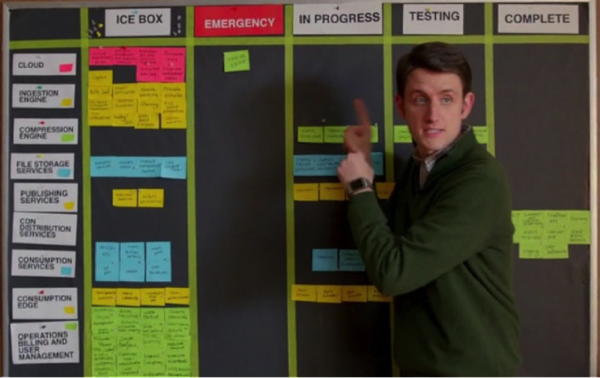Raising an Agile Family
A lesson for every parent out there on using lean & agile methodologies in the home.
At SEED we employ a human-centred agile approach to software delivery and service innovation, which means involving clients through every step of the process, reducing risk of miscommunication and creating quality end-products through an entire team effort.
As well as working as a Software Engineer at SEED, I am the proud father of three boys.
One day, after assessing my current challenges within the home, I realised I could use these same agile principles to bring the best out of my family unit!
about-seed
This human-centred agile approach we use at SEED is called Scrum.
Scrum involves:
- Breaking all project functionality into small tasks and creating a list of features called the product backlog;
- Creating a priority list of features to be built for the current sprint (this priority list is created with the client, by assessing their vision and business goals); and
- Using fixed length iterations called Sprints (usually lasting two weeks) to deliver an agreed number of features (fully-tested and working) after each Sprint.
This means we involve our clients throughout the process of delivering their product or service, reducing the risk of miscommunication and ensuring that we are on the same page throughout the design, development and delivery processes.
In other words, it allows stakeholders to form a team and establish healthy expectations that can be tested within a time period.
Now, my family currently consists of my wife and three boys – a five-year-old, a four-year-old and a three-month-old.
When our youngest son was born, there was a shuffling in the family as the identity of our older two boys was a bit shaken within the family structure.
They had to grapple with what life looked like with a “new kid on the block” (pardon the 80s pun).
This included testing boundaries and abnormal attention seeking.
At a particular moment of desperation, after some odd misbehaviour from our oldest two boys (parents reading this will probably know what I am talking about), I realised that the house had become a battle of wills, and I was losing.
Then I had a thought – 'What if I used the Scrum principles within the family?'.
My adventurous wife agreed and that Friday we had our first team 'Sprint' meeting.

Our Family Stand-up Format
Our Sprint stand-up meetings at work consist of the following questions:
- What did you do last week
- What are you doing this week
- Is there anything standing in your way
In our family Sprint stand-ups, we have modified this as follows:
- What did you do well last week
- What can you work on this week (character building)
- Is there anything in your way that we can help you with?
Specifically, a breakdown of our meeting looks like this:
- For each team member, ALL team/family members have to say one good thing they saw that person do or say the previous week (including that member). Once everyone has said something, we sing “For he/she is a jolly good fellow";
- We collectively come up with one tangible character building task that that person can work on that week. The member should agree to the character-building task assigned to them (for example, prioritising a feature); and
- Once we have gone through each family member, we discuss what might be needed to accomplish our tasks. We also lump into this step, general family admin as well.

Results
I can tell you that the results have been phenomenal. More than I could have hoped for.
I cannot speak for the rest of my family, but I can say that for me a consistent theme of 'patience' came up through each meeting (from all members) for the first several weeks.
This taught me something about myself.
When I thought I was nearly a perfect dad/husband, my family saw areas of improvement in my life.
Although this stung my pride a bit, I realised it was not about me, but about being a healthy and thriving family team. In a culture of honour, we are allowed to make mistakes and grow from them.
Testimonials
As consultants, we love results. So I will present to the following observations that I have made:
- Throughout the weeks, when my boys did something completely outrageous (again, if you are a parent you will understand what I am talking about) I would go into my “Arg, I don’t even know what to do here' mode. If I began to lose it, my oldest boy would say: 'Daddy, remember… you are working on patience this week'. A good percentage of the time this would melt my heart and I would apologise and go in for a hug. SUCCESS!
- I watched as one of my boys was confronted with a situation involving his character-building task. In the moment, he stopped, he considered, and he did what we suggested him to do. I was astonished and bent down and told him how proud I was of him. SUCCESS!

Tips for an Agile Family
Here are a couple things we found that have been helpful in running agile family meetings:
- Set a reward at the end of the meeting. It is hard to get children to focus (no matter what age). So we have a movie and popcorn afterwards. And with a set bedtime, the more they goof around during their meeting, the less chance of a full movie they get.
- Run meetings on the weekend. We run our meetings Friday night and this gives us a clear delineation between the last week and the week to come.
- Depending on how old the children are, will determine tasks of character building for the week. Truthfulness and trust are good topics throughout the ages.
- Some things should not be a task of character-building. I should not ask my company to pay me. It comes with the job. Likewise, there are things in the family that should be set as your core beliefs. But that is a topic for another time.
- More than one character-building task per week becomes burdensome, so you prioritise your requests (especially between husbands and wives).
- If you are not able to think of something another member did well, you are in the wrong mindset. Human beings thrive off of encouragement, not discouragement.
In a subsequent blog, I will discuss how our family uses Slack and Trello to carry out further family management.
Want some help on building your startup, growing your business and creating products/services that your customers will love? Contact SEED to make an inquiry.
